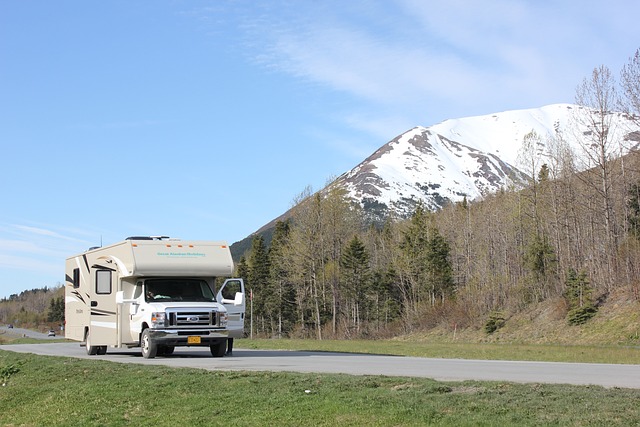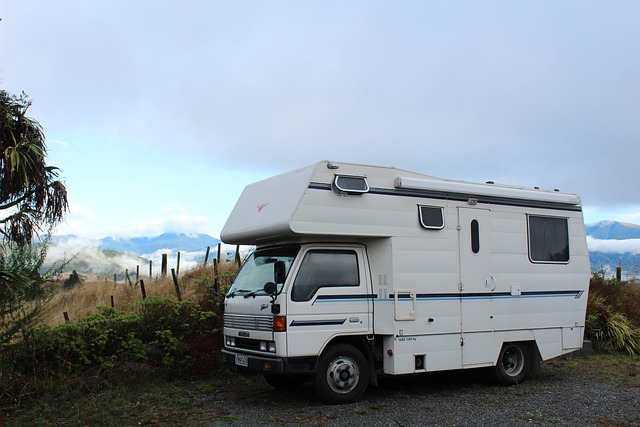For those embarking on their RVing journey, "RVing for Beginners" offers a concise yet comprehensive guide to mastering your vehicle's essential systems. It's crucial to understand the dual electrical systems—12-volt for lighting and small appliances, and 120-volt similar to household electricity for larger appliances—and how to safely use and maintain them, including the proper care and maintenance of deep-cycle batteries that power these systems. Additionally, proficiency in managing your RV's propane system is vital, as it fuels critical appliances like the refrigerator and furnace. Safety measures include inspecting for leaks, knowing how to shut off the gas supply, and understanding the implications of full or empty propane tanks on the RV's performance. Water management also plays a key role, from recognizing your tank's capacity to safely filling, using, and disposing of water, as well as operating the water heater. Adhering to these guidelines will ensure that novice RVers can confidently and comfortably navigate their adventures on the road, making "RVing for Beginners" an indispensable resource for a successful RV lifestyle.
Embarking on an RV journey offers a blend of adventure and comfort. For beginners in RVing, mastering the intricacies of your vehicle’s systems—electricity, water, and propane—is key to a seamless experience. This comprehensive guide demystifies these essential components, ensuring you stay powered, hydrated, and gassed up for all your travel needs. From electricity to batteries, water management to gas requirements, each system plays a vital role in the functionality of your RV. Dive into practical insights that will enhance your understanding and appreciation of your RV’s systems, making your travels more enjoyable and stress-free.
- Getting Comfortable with Your RV's Power Systems: Electricity and Batteries
- Mastering Water Management: Fresh, Waste, and Greywater in an RV
- The Propane Essentials: Understanding Your RV's Gas Needs
- Essential Tips for Beginner RVers: Making the Most of Your RV Systems
Getting Comfortable with Your RV's Power Systems: Electricity and Batteries

Embarking on the RVing journey for beginners invariably involves a learning curve, particularly when it comes to understanding and managing your RV’s power systems. Electricity is the lifeblood of modern RVs, powering everything from lighting and appliances to heating and cooling systems. As a new RVer, it’s crucial to familiarize yourself with the electrical setup to maintain comfort and safety on the road. Your RV is typically equipped with both 12-volt and 120-volt systems. The 12-volt system, which is powered by your RV’s batteries and charged by your vehicle’s alternator or an independent solar charging system, is for low-power applications like lighting, small appliances, and running water pumps. On the other hand, the 120-volt system, similar to your home’s electrical setup, is used for higher power needs such as refrigerators, air conditioners, and microwaves. This dual system allows you to be self-sufficient, disconnected from traditional power sources, making RVing for beginners an attractive and versatile lifestyle choice.
Batteries are the cornerstone of your RV’s 12-volt system, and understanding how they function is essential. There are different types of batteries used in RVs, with deep-cycle batteries being the most common due to their ability to sustain numerous discharge/recharge cycles without compromising performance. To ensure optimal battery health and longevity, it’s important to monitor battery levels and prevent overcharging or deep discharging. Incorporating solar panels can significantly extend your energy autonomy and reduce reliance on external power sources. Beginners should also learn how to use inverters, which convert 12-volt DC power into 120-volt AC power, enabling the use of standard household appliances when connected to a suitable power source. By gaining proficiency in managing your RV’s electrical systems, you can enhance your comfort and ensure a smooth and enjoyable RVing experience.
Mastering Water Management: Fresh, Waste, and Greywater in an RV

The Propane Essentials: Understanding Your RV's Gas Needs

When embarking on an RVing journey, mastery over your vehicle’s propane system is essential for a comfortable and safe experience. Your RV’s propane setup is designed to power various appliances such as the refrigerator, stove, furnace, and water heater. Understanding your RV’s gas needs requires familiarity with how these systems function and how to properly manage the propane supply. Beginners should start by locating the propane tanks, checking for any leaks with soapy water, and understanding the operation of each appliance that relies on propane. It’s crucial to know how to turn off the propane at the tank valve in case of an emergency, as well as how to refill or exchange empty tanks. Proper ventilation is key when using indoor propane appliances to avoid carbon monoxide poisoning. Additionally, be mindful of the weight of your propane tanks when they are full, as this can significantly affect your RV’s handling and fuel efficiency. Regularly inspect your propane lines for any signs of wear or damage, and ensure that all connections are secure. By taking these steps, you’ll not only enhance your understanding of your RV’s propane system but also ensure a safer and more enjoyable RVing experience for beginners and seasoned travelers alike.
Essential Tips for Beginner RVers: Making the Most of Your RV Systems

When embarking on your RVing journey, mastery over your vehicle’s systems is paramount for a comfortable and safe experience. For beginners, it’s crucial to understand how to effectively manage electricity, water, and propane systems within your RV. Firstly, familiarize yourself with the electrical setup: know where your breakers are located, understand the difference between 12-volt and 120-volt systems, and learn how to properly use electrical hookups when available. Always ensure that you’re using the correct adapters and extension cords to prevent damage to your RV’s electrical components.
Secondly, water management is essential for maintaining both potability and system functionality. Familiarize yourself with your RV’s freshwater tank capacity and learn how to fill, use, and dump it properly. Additionally, understand the operation of your RV’s water heater, including how to light it and set the temperature. When it comes to propane, be mindful of the levels in your tanks and learn how to safely switch between appliances that require this fuel source. Regularly check for any signs of leaks or damage to hoses and connections, and always store and use propane according to manufacturer guidelines. By taking these proactive steps, beginners can confidently navigate their RV’s systems, ensuring a more enjoyable and trouble-free RVing experience.
RVing for beginners can be an exhilarating journey, and a key aspect of this adventure is mastering the various systems within your recreational vehicle. This article has demystified the critical components of RV life: electricity, water, and propane. By understanding how to manage each system, you’ll ensure a comfortable and efficient travel experience. Whether it’s optimizing your electrical setup for power efficiency, effectively managing your freshwater and waste systems, or safely handling your propane needs, these insights are designed to enhance your RVing journey. With these essential tips and knowledge at hand, you’re now better equipped to navigate the road less traveled with confidence. Happy trails!
